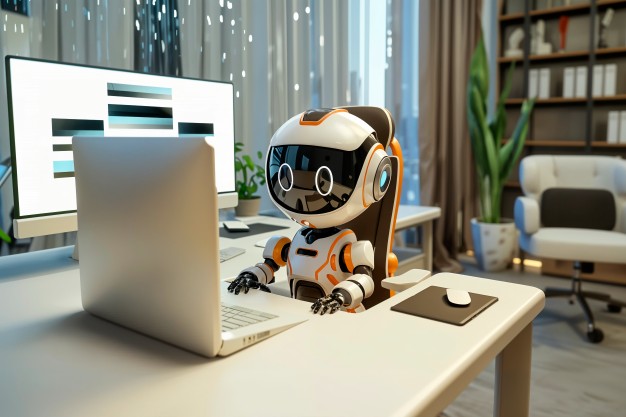What makes computer science the backbone of modern innovation?
Listen to this Article

Computer Science and Engineering have changed our world just like the printing press did long ago. From basic computers to today's powerful AI and quantum computers, this field has grown and continues to drive amazing new inventions.
An invention in the 15th century transformed how information was disseminated and consumed with a profound impact on society. Sounds familiar? The printing press revolutionised society in the same way that the Computer, the Internet and Artificial Intelligence (AI)/ Machine Learning (ML)have affected society over the last few decades. Computer Science and Engineering has evolved over this period from basic computational processes and the early mechanical computers to modern digital computers with vast processing power.
The last decade has seen computer science making immense contributions to the boom in AI and Data Science. The development of neural networks and machine-learning algorithms has led to machines learning from data, making predictions, and even mimicking human intelligence.
Professor Amey Karkare, Head of Computer Science & Engineering Department, IIT Kanpur has shared insights on what makes computer science the backbone of modern innovation.
POTENTIAL IN THE FIELD OF COMPUTER SCIENCE
Developments in semiconductors and computer hardware technology have dramatically boosted computing power and efficiency. The miniaturisation of transistors, following Moore's Law, has led to the creation of highly powerful and energy-efficient processors. Innovations such as solid-state drives (SSDs), advanced graphics processing units (GPUs), and quantum computing hardware are further pushing the boundaries, enabling faster data processing, enhanced storage capabilities, and new computational paradigms.
The very processing and utilisation of data to make intelligent decisions has changed, driving innovation through complex computations and real-time data analysis.
The last decade has seen computer science making immense contributions to the boom in AI and Data Science. The development of neural networks and machine-learning algorithms has led to machines learning from data, making predictions, and even mimicking human intelligence.
This in turn is translating to rapid advances across sectors, with personalised medicine revolutionising healthcare, self-driving cars changing transportation, and virtual assistants changing the mundanity of daily life itself.
AI is now able to recognise words and speech and interpret images better than humans, to the point that it is capable of exams and coding interviews. The rapid growth in AI is unlikely to slow down, driven by progress in computing, data analysis and interpretation and algorithms. And as our reliance on technology increases, so does the need for systems that are secure.
CSE also plays a crucial role in cybersecurity, developing robust encryption algorithms, intrusion detection systems, and ethical hacking practices to combat the growing threat of cyberattacks that can disrupt lives and society.
These factors give computer science tremendous potential as a field of study for students of engineering. Its growing importance over the decades is visible through the journey of leading science and technology institutions in India.
An example is IIT Kanpur, a pioneer in computer science education in India, which began the first computer courses in 1963 with a single IBM 1620 system. Today, the department boasts a vibrant faculty, cutting-edge research, and a steady stream of graduates who go on to lead in academia, industry, and entrepreneurship.
RISING DEMAND FOR SKILLED ENGINEERS
The demand for computer science professionals is increasing, especially in India and the United States. As technology becomes integral to all sectors, there are abundant job opportunities in software development, cybersecurity, data analysis, and more.
A recent study estimated that 9-10 lakh jobs for skilled engineers would be created over the next year and a half to meet the demand due to rapid digitisation in various tech and non-tech sectors. Demand for software engineers is projected to rise by 22 percent in 2025 across sectors such as healthcare, BFSI, telecom, automotive, etc.
FUTURE IS BRIGHT
Looking ahead, the future of computer science and engineering is incredibly promising, with the potential to transform various aspects of our lives. Computer science is also at the forefront of developing quantum computing, a revolutionary technology that harnesses the principles of quantum mechanics to perform computations far beyond the capabilities of conventional computers.
Quantum computing holds the potential to revolutionise fields like drug discovery, materials science, and cryptography, which will lead to future breakthroughs in these fields.
However, as the future continues to evolve and throw up more challenges, cybersecurity will gain more importance to protect sensitive information and maintain the integrity of systems to ensure robust, reliable digital infrastructure.
Ethical considerations will also need to be taken into account and professionals will play a crucial role in developing ethical frameworks for AI and automation, ensuring that these technologies are used responsibly and for the benefit of humanity.
IIT Kanpur has a distinguished track record for being amongst the first to introduce research into future-proof technologies such as quantum physics, quantum computing, and quantum communication.
To keep pace with the rapid developments, IIT Kanpur has taken the lead in fields such as Quantum Cryptography, undertaking extensive research in this domain which is crucial for safeguarding data confidentiality, integrity, and network security.
The field of computer science and engineering beckons students to immerse themselves in the backbone of modern innovation and get ready to forge our future by learning to design and build the technologies of tomorrow! .
Also Read: 7 Surprise! These animals can help fight climate change - Part 1
Source: snexplores.org


